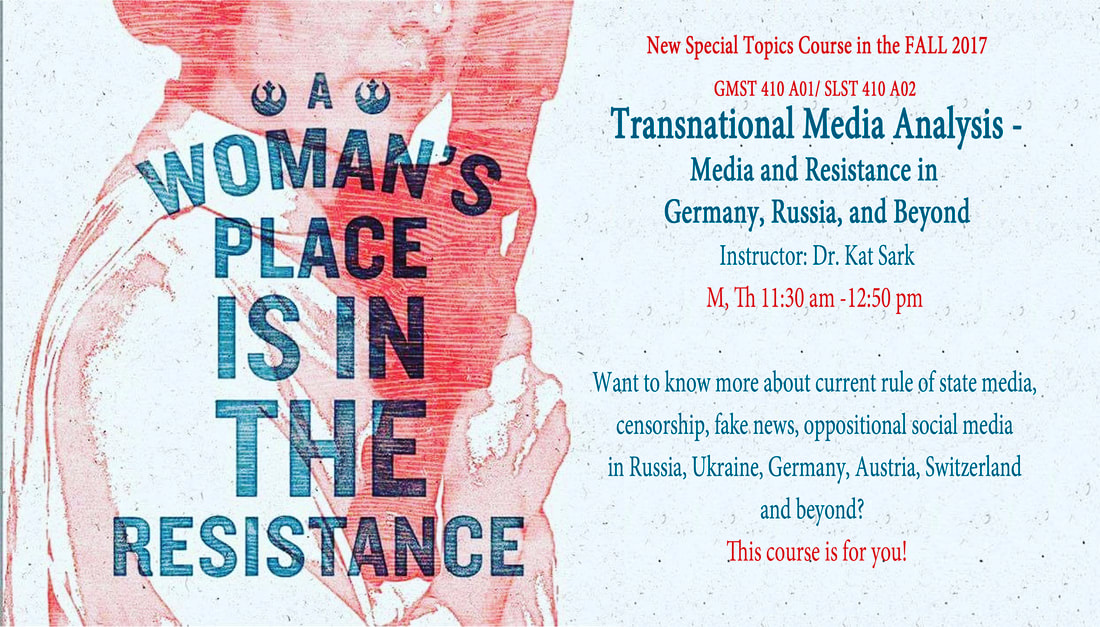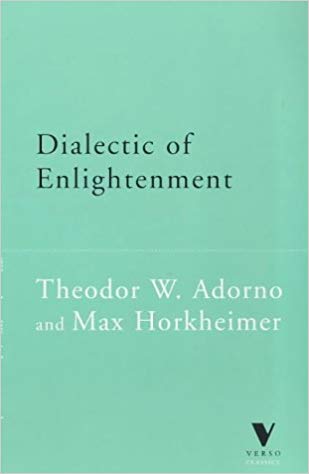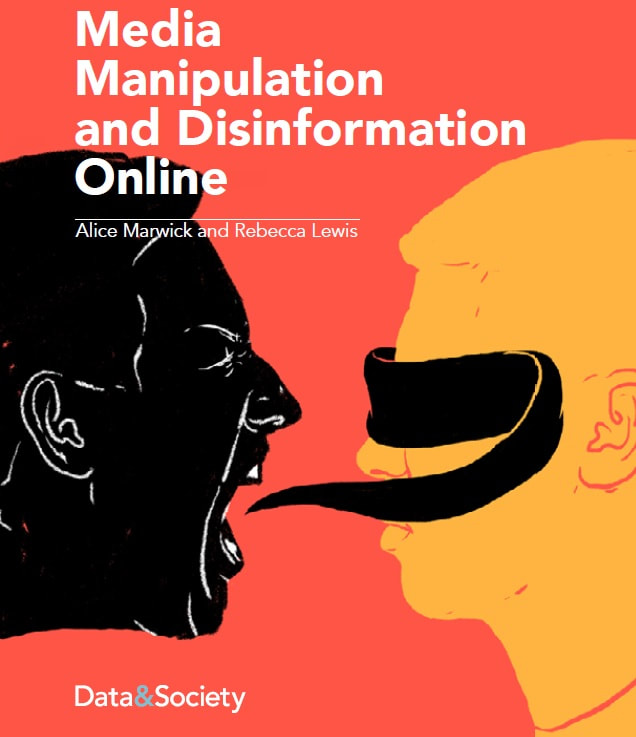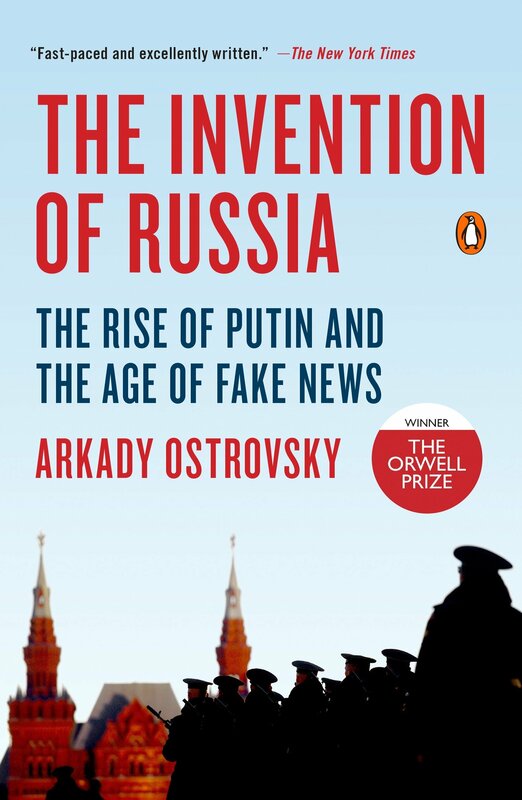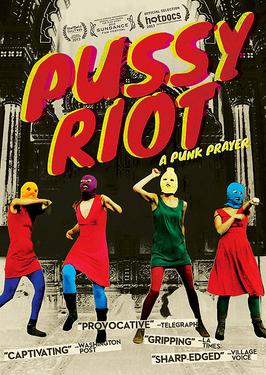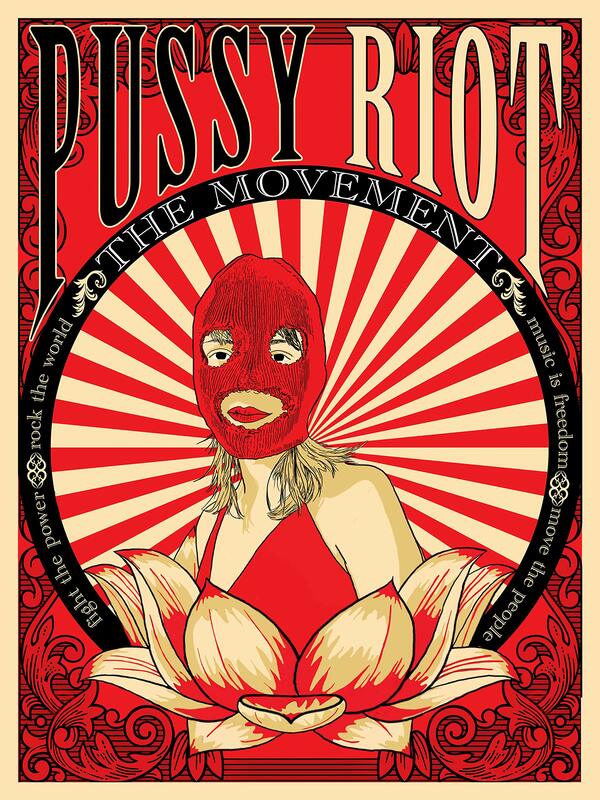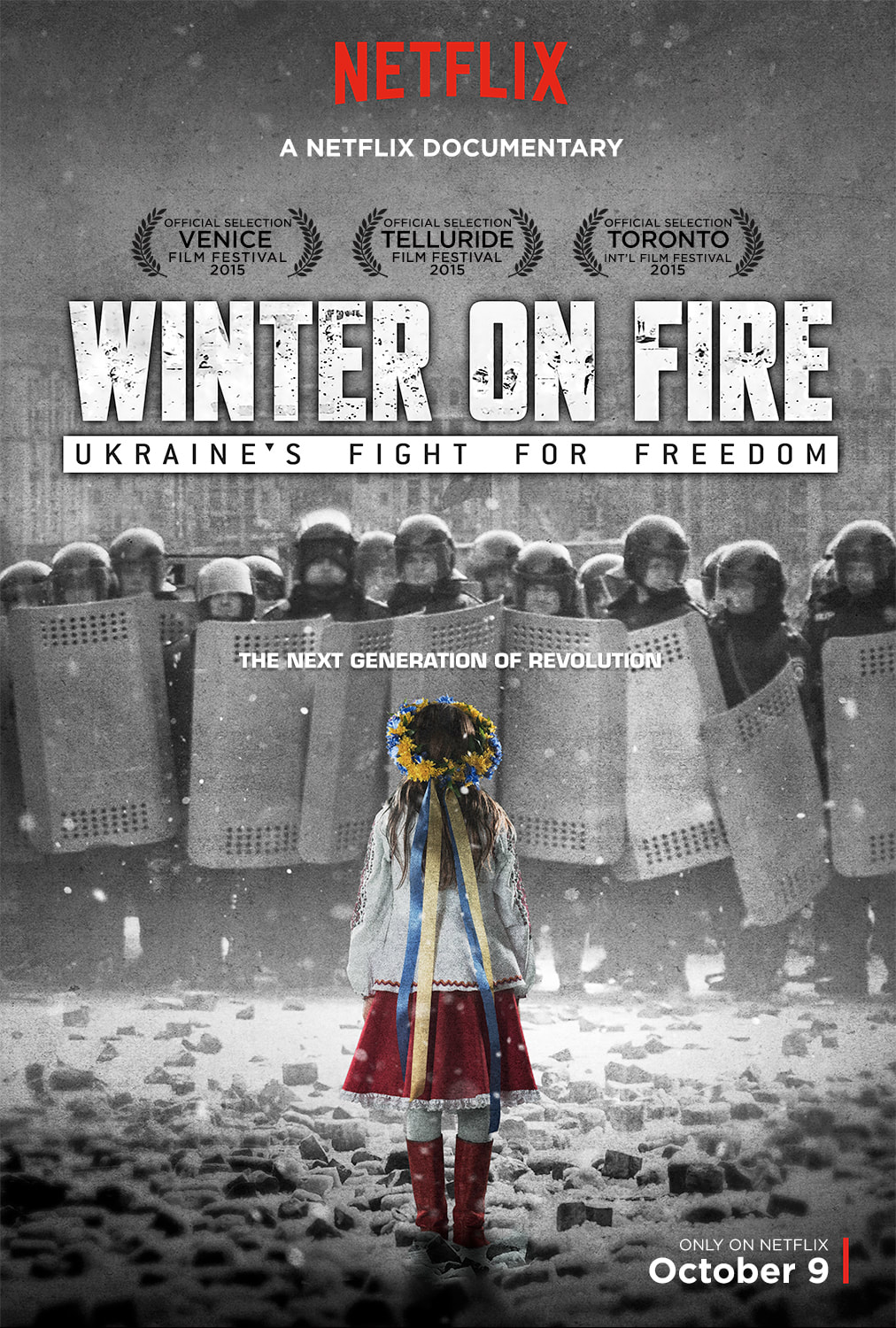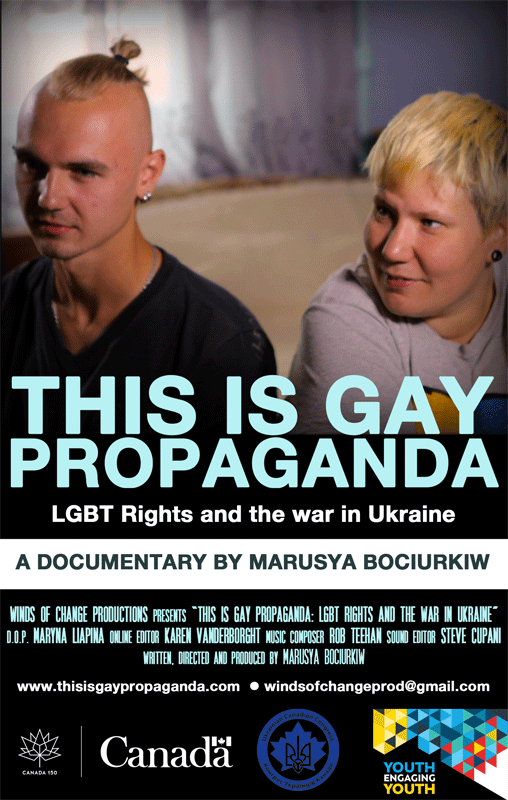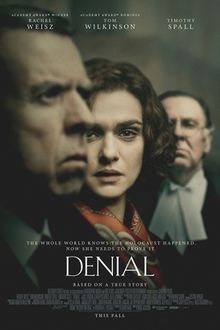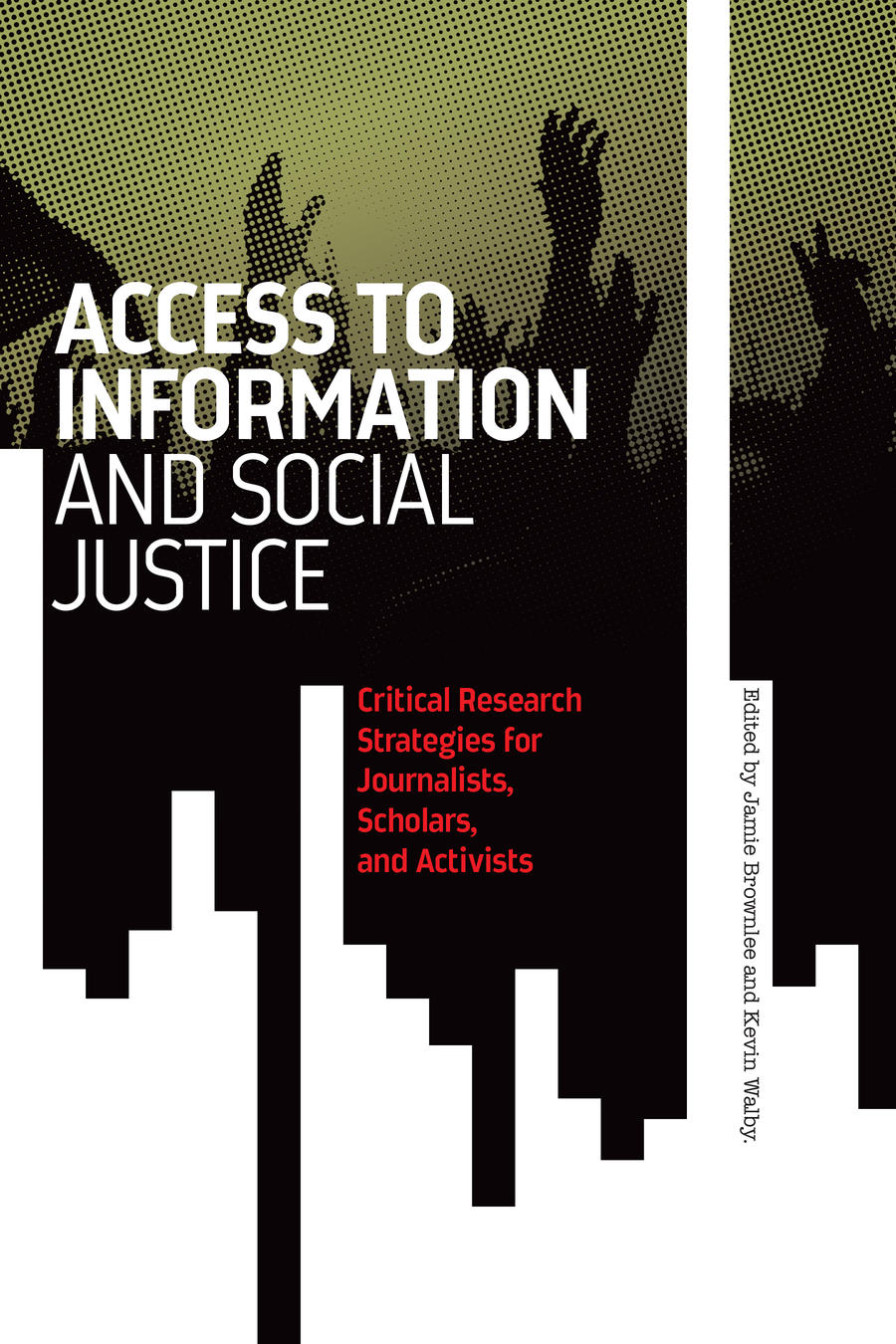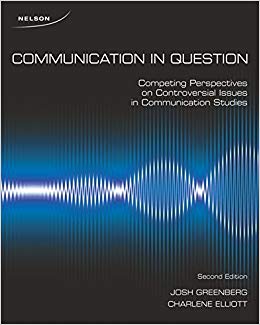Transnational Media Analysis
Taught at the Department of Germanic and Slavic Studies at the University of Victoria
Course by Dr. Kat Sark
Course by Dr. Kat Sark
Course Description:
This course combines critical media literacy with Slavic and Germanic cultural studies. Students will develop their research, critical, and analytical stills by examining the representations and constructions of cultural and media discourses, including fake news, the rule of state and corporate media, and oppositional social media platforms. This course is an interdisciplinary, comparative, multimedia course for undergraduate and graduate students.
Some of the topics covered will include current media censorship, corporate and mainstream media, as well as various media outlets that have formed in opposition to corporate media. This course will also allow students to engage in multimedia analysis of film, photography, magazines, news outlets, blogs, and other digital and social media. The case studies selected for this course will include discussions of gender, race, class, minorities, refugees, human rights, social justice, identity politics, LGBTQ rights, censorship, propaganda, and technology. It is imperative that students come to class prepared for the discussion of assigned readings and topics. This course is based on inter-teaching techniques and peer communication. Do not let your class mates down by coming to class late or unprepared.
Some of the topics covered will include current media censorship, corporate and mainstream media, as well as various media outlets that have formed in opposition to corporate media. This course will also allow students to engage in multimedia analysis of film, photography, magazines, news outlets, blogs, and other digital and social media. The case studies selected for this course will include discussions of gender, race, class, minorities, refugees, human rights, social justice, identity politics, LGBTQ rights, censorship, propaganda, and technology. It is imperative that students come to class prepared for the discussion of assigned readings and topics. This course is based on inter-teaching techniques and peer communication. Do not let your class mates down by coming to class late or unprepared.
Course Outline:
(Subject to changes / in progress)
|
Week 1
|
Introduction, Methodologies
Media Studies – key concepts – culture and media industries Cultural industries Corporate Media Hegemony Daring Discussion Tool Kit READINGS: Theodor W. Adorno and Max Horkheimer, “The Culture Industry: Enlightenment as Mass Deception” Dialectic of Enlightenment (1944) pp.94-136 |
GROUP WORK: Rank different kinds of media you use, analyze your online activity
|
|
Week 2
|
Critical Media Analysis Tools
READINGS: Alice Marwick and Rebecca Lewis, Media Manipulation and Disinformation Online (2017) FILM: Requiem for the American Dream (dir. Kelly Nyks, Peter D. Hutchison, Jared P. Scott, 2015, 73min) VIDEO: Noam Chomsky on Manufacturing Consent |
DISCUSSION:
What is critical media literacy? What are culture and media industries? What is “manufactured consent”? What is “fashionable consumption”? |
|
Week 3
|
Russian Media
READINGS: Ostrovsky, The Invention of Russia, Preface, Prologue, Chapter 1 and 2 Masha Gessen, “Autocrat’s Language” New York Times Review of Books FILM: Icarus (dir. Bryan Fogel, 2017, 120min) |
DISCUSSION:
What are some of the tactics for media manipulation? Are they effective? |
|
Week 4
|
Russian Media
READINGS: Ostrovsky, The Invention of Russia, Chapter 3, 4, 5, 6 Masha Gessen, “Lies,” New York Times VIDEO: TED Talk by Tristan Harris, “The manipulative tricks tech companies use to capture your attention” FILM: Pussy Riot: A Punk’s Prayer (dir. Maxim Pozdorovkin, Mike Lerner, 2013, 93min) |
DISCUSSION:
Provide a critical analysis of the documentary film. |
|
Week 5
|
Russian Media
READINGS: Ostrovsky, The Invention of Russia, Chapter 7,8,9,10 Masha Gessen, Russian Resistance NYTimes Review of Books VIDEO: Laura Galante TED Talk on how Russia hacked US election FILM: Pussy Riot: The Movement (dir. Natasha Fissiak, 2013, 86min) |
DISCUSSION:
Provide a critical analysis of the documentary film. |
|
Week 6
|
Ukrainian Media
READINGS: Review of Winter on Fire by Lev Golinkin, The Nation, 2016 FILM: Winter on Fire (dir. Evgeny Afineevsky, 2015, 102min) PODCAST: NPR podcast: Ukraine vs. Fake News |
DISCUSSION:
Provide a critical analysis of the documentary film. |
|
Week 7
|
Ukrainian Media
READINGS: Masha Gessen, “Gay Men Who Fled Chechnya” The New Yorker FILM: This is Gay Propaganda: LGBT Rights and the War in Ukraine (dir. Marusya Bociurkiw, 2015, 54min) |
DISCUSSION:
Provide a critical analysis of the documentary film. |
|
Week 8
|
German Media
READINGS: Zoe Williams, “Totalitarianism in the Age of Trump: Lessons from Hannah Arendt” The Guardian, February 2017 Karen Greenberg, “Beyond the Origins of Totalitarianism” New Republic, April 2017 VIDEO: Deborah Lipstadt TED Talk on Facts, Opinions, and Lies FILM: The Denial (dir. Mick Jackson, 2016) |
DISCUSSION:
Summarize the rise of the right-wing political parties and alt-right populist movements in Germany. what role does the media play? What post-war laws have been put in place regulating Holocaust denial and hate-speech in Germany? |
|
Week 9
|
Canadian Media
READINGS: Jamie Brownlee and Kevin Walby (eds.) Access to Information and Social Justice: Critical Research Strategies for Journalists, Scholars, and Activists (2015) Introduction and Chapter 4, pp.1-20 and pp.75-93 Journalist protection in Canada PODCAST: Journalism and Violence, Project Censored VIDEO: Eli Pariser TED Talk on Social Media Filter Bubbles |
DISCUSSION:
How would you describe the Canadian media landscape? What are some challenges in Canadian media? |
|
Week 10
|
Independent Media
READINGS: Patrick McCurdy, “Societal Game Changer: The Political Potential – and Power – of Social Media,” Communication in Question: Competing Perspectives on Controversial Issues in Communication Studies (2013) pp.144-158 Ian Reilly, “New(s) Parodies, New(s) Alternatives,” Communication in Question (2013), pp. 281-287 Tribe Worthy PODCAST: New Approaches to Journalism, Project Censored FILM: Project Censored: The Movie (dir. Christopher Oscar, Doug Hecker, 2013, 60min) |
DISCUSSION:
What is independent media and how can it be sustainable? What role does social media play in independent media? |
|
Week 11
|
Web Project Presentations
|
DISCUSSION:
|
|
Week 12
|
Web Project Presentations
|
DISCUSSION:
|
Disclaimer: The contents of this site are copy-right protected and cannot be reproduced without the author's permission. © Katrina Sark, 2019
